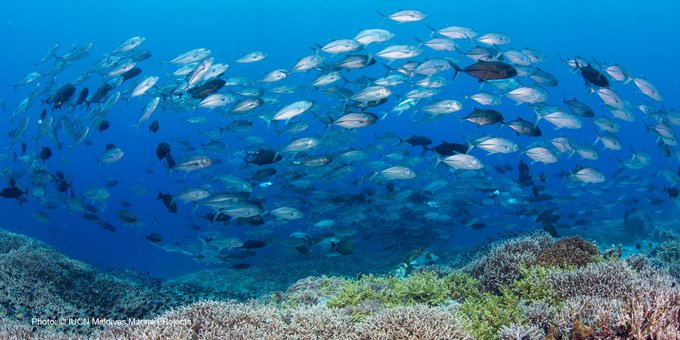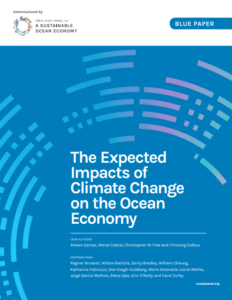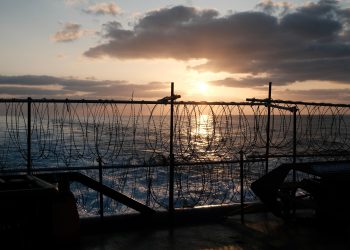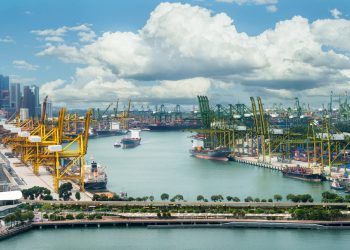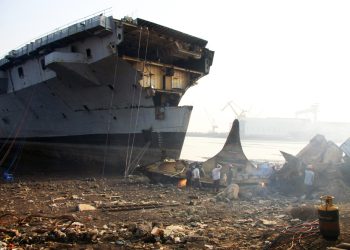Climate change is decreasing the productivity of marine fisheries on a global scale, with some regions experiencing large gains in productivity and others experiencing large losses; Thus, the reports states that climate change will serious impact ocean and coral reef tourism.
Specifically, the paper was issued by the High Level Panel for a Sustainable Ocean Economy, a group of 14 heads of government, ‘The expected impacts of climate change on the ocean economy’ assesses global to local climate impacts on three of the largest sources of ocean-based revenue and jobs – coral reef tourism, wild capture fisheries and marine aquaculture.
Accordingly the primary threats to unfed bivalve aquaculture and fed finfish and crustacean aquaculture are the following:
- Ocean warming is expected to raise mortality rates and lower productivity for higher-trophic-level species;
- Sea level rise will increase the intrusion of saline water into deltas and estuaries compromising brackish-water aquaculture, and shifting shoreline morphology could reduce habitat availability;
- Increasing storm strength and frequency pose risks to infrastructure, and increased weather variability has been associated with lower profits (bivalves, finfish, crustaceans);
- Ocean acidification impedes the calcification of mollusc shells resulting in reduced recruitment, higher mortality and increased vulnerability to disease and parasites;
- Increasing rainfall will raise the turbidity and nutrient loading of rivers, potentially causing more harmful algal blooms (HABs) that reduce production and threaten human health (bivalves, finfish, crustaceans);
- The emergence, translocation and virulence of disease, pathogens and parasites are impacted by climate change. For example, warming can increase susceptibility to disease, promote the influx of new pathogens and increase the toxicity of common pollutants (bivalves, finfish, crustaceans);
- Reduced feed availability resulting from climate change and/or overfishing could challenge the growth potential for fed aquaculture (finfish, crustaceans).
In addition, the paper alerts on the possibility that the climate change could lead to a 90% of coral tourism revenue losses in Australia by 2100.
[smlsubform prepend=”GET THE SAFETY4SEA IN YOUR INBOX!” showname=false emailtxt=”” emailholder=”Enter your email address” showsubmit=true submittxt=”Submit” jsthanks=false thankyou=”Thank you for subscribing to our mailing list”]
In light of the challenges expressed above, the report recommends on the implementation of certain key strategies, to build socioecological resilience to climate change and ensure the continued, or improved, provision of functions and services from the ocean, especially for the most vulnerable coastal nations. In essence:
- A focus on equity. It will thus be profoundly important to examine the equity implications of all new and existing management decisions across all three sectors.
- Looking forward.
- Cooperating across boundaries. As suitable habitats shift and change, marine species will move across jurisdictional boundaries and regional, national and international cooperative agreements will be necessary to ensure that these species are well-managed, and that the benefits are fairly distributed during and after the transitions.
Additionally, the High Level Panel analysis used new models to assess impacts at country and regional levels, identifying that coral reef tourism industries in Egypt, Indonesia, Mexico and Thailand will also be hit hard.
Overall, the paper calls for a forward looking cooperative and equitable response to managing the impacts of climate change on the ocean economy, focusing on the importance of adaptive fisheries management and new cooperative agreements across national, regional and international boundaries to ensure species are well-managed as suitable habitats shift and change.
Steve Gaines, co-author of the analysis and High Level Panel Expert Group4 representative, commented that
Only now are we starting to comprehend the full force that unabated global heating will unleash on our key ocean industries – and it is chilling. To avert an impending economic crisis, widespread devastation to communities, hunger and resource conflicts in coming decades, we must urgently restore ocean health.
Concluding, to explore more on “The expected impacts of climate change on the ocean economy”, click herebelow
































